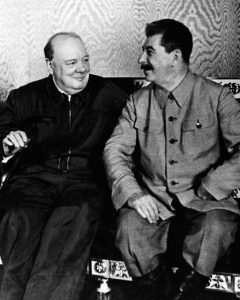Trump, Russia, and Churchill’s Wisdom
Published 8 March 2017 on the Daily Caller, under the title “A Lesson on Russia for Trump.” Their title, not mine; I do not presume to offer anyone lessons.

“I cannot forecast to you the action of Russia. It is a riddle wrapped in a mystery inside an enigma: but perhaps there is a key. That key is Russian national interest.” —Winston Churchill, 1939
“If Putin likes Trump, guess what, folks, that’s called an asset, not a liability. Now I don’t know that I’m going to get along with Vladimir Putin. I hope I do. But there’s a good chance I won’t.” —Donald Trump, 2017
Russia National Interests
Trump-Churchill comparisons are invidious and silly. After all, we’re not working with the same raw material. But their two statements are oddly congruent. Churchill’s Russian experience has something to offer the President as he embarks on his own attempt—fraught as it may be—at a modus operandi with Mr. Putin.
In the 1930s Churchill had to decide which was the greater threat: Stalin’s Soviet Union, whose tyranny was still confined to its borders; or the Greater German Reich, which had by 1939 swallowed the Saarland, the Rhineland, Austria and Czechoslovakia, and was threatening Poland.
Churchill’s study of history held the answer: Britain had always backed the second strongest powers on the European continent: France, of course…and Russia.
“Historic life interests”
Ever the deft rhetorician, Churchill was unafraid to criticize “Soviet” economics, but foresaw the need to appeal to “Russian” national interests in the coming confrontation with Hitler. To paraphrase Churchill, “It cannot be in accordance with the interest or the safety of Russia,” Churchill said in 1939, “that Germany should plant itself upon the shores of the Black Sea, or that it should overrun the Balkan States and subjugate the Slavonic peoples of South-Eastern Europe. That would be contrary to the historic life-interests of Russia.”
Accordingly, earlier in 1939, after Prime Minister Chamberlain had issued a belated guarantee to defend Poland, Churchill cornered Ivan Maisky, the Soviet ambassador. Adopting what today seems almost Trumpist language, he asked the ambassador for his support:
Look here Mr. Ambassador, if we are to make a success of this new policy we require the help of Russia. Now I don’t care for your system and I never have, but the Poles and the Romanians like it even less. Although they might be prepared at a pinch to let you in, they would certainly want some assurances that you would eventually get out.
Maisky liked this blunt approach and conveyed Churchill’s views to Moscow. Alas Churchill was out of power, and Chamberlain—not without reason—regarded Stalin as a thug. He sent low-level negotiators to Moscow, to hint at some vague future agreement. Hitler sent his foreign minister. The resultant Nazi-Soviet non-aggression pact left Germany free to attack Poland, and World War II was on.
“Favourable reference to the Devil”
When the two tyrants fell out and Hitler invaded Russia in June 1941, Churchill, now prime minister, reverted to type, promising Moscow all-out support. An aide reminded him of the dreadful things he’d said about communists. Churchill growled: “If Hitler invaded Hell, I would at least make a favourable reference to the Devil in the House of Commons.” Again he pursued the main objective: victory.
Churchill’s Russian experience was stony. In the war, he failed to save the Balkans and central Europe from the onrushing Red Army. He did save Greece, and foster a semi-independent Yugoslavia. Given the military situation, it was the best he could do with the prevailing situation.
Of the Russians, he said in 1946: “There is nothing they admire so much as strength, and there is nothing for which they have less respect than weakness, especially military weakness. But he qualified that in 1951: “I do not hold that we should rearm in order to fight. I hold that we should rearm in order to parley.”
It’s Still National Interest
Churchill never abandoned his idea of appealing to national interests. After Stalin’s death in 1953, he urged “a meeting at the summit,” but Eisenhower resisted. Russia might have a new dress, the President declared, but “there was the same whore underneath it.” Even Ike spoke like Donald Trump on occasion.
Well, it cannot be in accordance with the interest or the safety of Russia that ISIS should plant itself upon the shores of the Mediterranean, or that it should overrun Syria and subjugate the Iraqi peoples. That would be contrary to the historic life-interests of Russia. There lies a Churchillian opportunity.
Mr. Trump believes he can work with the Muscovites. So too did Churchill, when his country’s fate hung in the balance. Churchill met with little enough success. But when he did, it was when he dangled “national interest” in front of the Russians.






